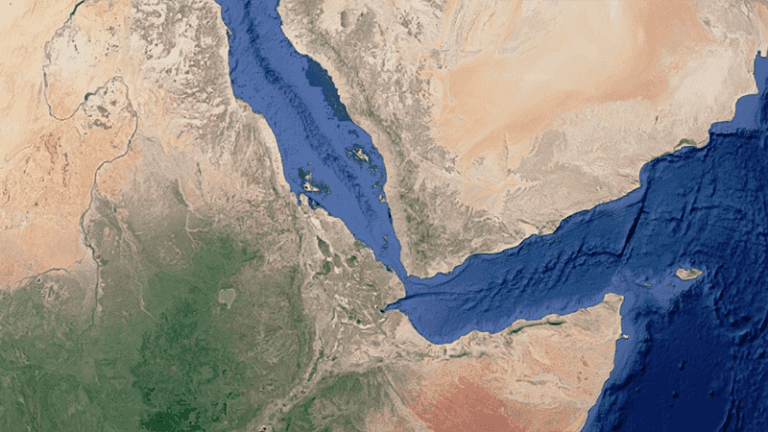
The Red Sea subsystem was and will remain one of the most important maritime passages linking the East and West. The study of profound changes in the region’s strategic and security environment involves key players within and outside the regional subsystem. Many variables are at the heart of these changes and they are complicated by built-in irregularities caused by the interests, preferences, and contradictions of the different actors involved. On the regional level, the subsystem includes Saudi Arabia, Qatar, the United Arab Emirates, Oman, Yemen, Egypt, Israel, Jordan, Sudan, Eritrea, Ethiopia, Djibouti, Iran, and Turkey. Internationally, four powers vie for influence and supremacy, each according to its capabilities and ambitions.
The United States is the most capable and effective in influencing the security and strategic environments of the Red Sea subsystem, followed by France through its presence in Djibouti, and to a lesser extent China and Russia. But China’s presence has a non-security-related impact because of its economic presence in the African heartland, specifically in Djibouti. This international presence may ignite a fierce competition between the United States and China and Russia, two powers that are seen as global competitors by the Trump Administration. Additionally, India, Spain, Japan, and others have participated in anti-piracy operations in the Gulf of Aden and the Arabian Sea.
A Panoply of Threats
The threats besetting the region continue to be terrorism, piracy, violation of human rights and the rights of the child, weapons stockpiles, frictions between countries, Iran’s covert assistance to the Houthis in Yemen, and the ongoing and long Saudi-Emirati war in that country. Furthermore, developments in the regional security situation may not be considered threats in themselves, but they can become real and widespread threats if their consequences become detrimental to the national interests of the countries of the region, or to their allies, and possibly to the maritime security of other countries outside the region.
Developments in the regional security situation may not be considered threats in themselves, but they can become real and widespread threats if their consequences become detrimental to the national interests of the countries of the region, or to their allies.
One such development is the popular intifada in Sudan––which forced the army to oust President Omar al-Bashir and his defense minister––and the insistence of the masses on achieving their full objectives of forming an elected civilian government and removing the generals from ruling the country. This popular accomplishment can be understood as a victory for the aspirations of the Sudanese masses; unfortunately, however, it led to a clear Saudi-Emirati intervention in the events as the two countries took the side of the military. A confrontation could erupt between the people who reject the rule of the military and those generals supported by the two countries. It cannot be denied that the existence of a Sudanese government loyal to the UAE-Saudi alliance stems from the need to ensure the continuation of the provision of the thousands of Sudanese soldiers who are fighting on behalf of Saudi Arabia and the UAE in Yemen.
Some of the expected concerns of the UAE intervention in Sudanese affairs after the ousting of Bashir are manifest in the future of the facilities granted to Turkey on the Sudanese island of Suakin in the Red Sea. Turkey views its presence there as very important that corresponds to the ruling Justice and Development Party’s (AKP) view of what it calls the extended Ottoman heritage. There is no doubt that every Turkish effort in the region will worry Egypt and increase its sensitivity toward Turkey.
Based on its declared hostile policy toward Qatar, the UAE’s containment policy—and possibly elimination of the Qatari agricultural and commercial investments in Sudan—may very well be among the objectives of the UAE intervention in Sudan.
Based on its declared hostile policy toward Qatar, the UAE’s containment policy—and possibly elimination of the Qatari agricultural and commercial investments in Sudan—may very well be among the objectives of the UAE intervention in Sudan. Some Egyptian researchers have tried to involve Qatar in the Suakin case, claiming the visit of the Qatari chief of staff, Lieutenant General Ghanem bin Shaheen Al-Ghanem, to Khartoum on the eve of Turkish President Recep Tayyip Erdoğan’s visit as one that causes concern.
The Peculiarity of Djibouti and the Horn of Africa
There is an intense international and regional competition taking place in the Red Sea and the Horn of Africa and it is clearly reflected in Djibouti. It is noteworthy that the US Africa Command (AFRICOM) is headquartered in Djibouti, where the French have also been involved historically, and there is a newly established Chinese military presence as well. There is no doubt that this may undermine and have a long-term negative impact on US interests, both in Africa and the Arabian Peninsula. The full-fledged Chinese presence at the heart of Bab al-Mandab Strait illustrates China’s far-reaching aims in such a geographically distant strategic environment and demonstrates Beijing’s desire to show its military colors. It is this complicated strategic situation in the Red Sea-Horn of Africa region that heightens the possibility of friction and increases the dangers of instability.
The full-fledged Chinese presence at the heart of Bab al-Mandab Strait illustrates China’s far-reaching aims in such a geographically distant strategic environment and demonstrates Beijing’s desire to show its military colors.
Saudi Arabia also conducted negotiations with the government of Djibouti in order to establish its own military presence in the country. But the negotiations stalled because of the ongoing GCC crisis; perhaps they will resume at a more suitable time. The UAE also sought to monopolize the Port of Djibouti through its Dubai Ports Authority which wanted to become a player in port activities; but this fell through when the president of Djibouti intervened to stop and cancel the deal.
National interests and worries for security and survival may be behind Djibouti’s decision to enter into such conflicting alliances. France has been the primary and historical guarantor of its sovereignty; but the United States is today the first global power that can provide more guarantees to its territorial integrity in an area of disputed borders. Other small states in the region––such as Qatar, Kuwait, Bahrain, the UAE, and even Israel––also find themselves looking for a security guarantor, which is the United States obviously. On the other hand, small states are always open for more protection and worried about close entanglements, which forces them to seek multiple guarantors, a situation that can today be applied to Djibouti.
Eritrea has its own justifications in leasing its islands and ports to conflicting interests. It is said that Iran, Israel, and the UAE had rented sea and port facilities in Eritrea. The UAE rented the Port of Assab and used it as a staging platform in its war against the Houthis in Yemen. Backed by Iran, the Houthis used to be supplied through the Port of Hodeida on the Yemeni coast from the Iranian-leased facilities in the Eritrean Dahlak Archipelago. Many allegations issued by the exiled Yemeni government and independent sources accused Iran of doing so. The Eritrean government denied those allegations without presenting any proof.
The Case of Somalia
Somalia and the Horn of Africa constitute an area where many potential threats to security and stability in the region may occur. It has been and may still be a pirate paradise despite the relative improvement in the security conditions of the sea traffic as a result of international intensification of anti-piracy operations in the Gulf of Aden and the Arabian Sea bordering the Somali coasts. Somalia granted Turkey a military base on Somali territory, which was used by Turkey to train and arm the Somali Army.
The existence of the Turkish military base in Somalia prompted the United Arab Emirates to push for a similar military presence. It has separately recognized the so-called Somaliland Republic and established a permanent military presence in Berbera at the tip of the Horn of Africa, on the western shore of the Gulf of Aden and the Arabian Sea.
A Dynamic but Dangerous Environment
The threats besetting the Red Sea regional subsystem and the expectations of security challenges are obviously products of multilayered rivalries in the area. These threats and expectations make the following conclusions necessary.
First, the activities of some countries in the region have been too disruptive to regional peace and security. Specifically, Iran and the UAE appear to be pushing the security situation in unwanted directions, and this will escalate tensions. Their primary concern is regional expansion despite the existence of other actors with a similar concern. On the other hand, an unsettling trend is beginning to appear regarding Saudi Arabia’s foreign policy in the Red Sea region. Developments over the last few years have shown that Saudi security and foreign policy are almost identical to those of the UAE, although the kingdom is the primary power in the Arabian Peninsula. What makes this conclusion even more worrisome is Egypt’s puzzling behavior in the region––as if it is a weak strategic actor––despite its status as the primary naval power. During this period, Egypt’s policies have also appeared as if they were a reflection of the UAE’s ambitious orientation.
Developments over the last few years have shown that Saudi security and foreign policy are almost identical to those of the UAE, although the kingdom is the primary power in the Arabian Peninsula.
Second, the war in Yemen will remain the greatest threat to regional security in the Red Sea area and the first justification for the Iranian presence in it. In the foreseeable future, there is no expectation that the Saudi-Emirati alliance will win this war. To be sure, the war will continue to be a drain on the assets of their sovereign wealth funds and will cause further human suffering and human rights violations.
Third, there is an important question about the real objectives of the Turkish presence in Somalia and Sudan and whether it will lead to possible conflict in the future. In fact, these objectives look to be tied to the fortunes of the Justice and Development Party, which has supported goals opposed by Saudi Arabia, the UAE, and Egypt. There also is the question of whether the AKP will succeed in making Turkey’s presence in the Red Sea area part of the country’s national security interests.
Fourth, Israel remains motivated to take advantage of all the negative repercussions in the realm of Arab security and the decreased Arab diplomatic capacity in inter-Arab conflicts. This was clearly seen in the success of Israel in making its internal political goals American objectives under President Trump and his administration; obvious examples are the recognition of Jerusalem as Israel’s capital and of Israeli sovereignty over the Golan Heights.
Fifth, future competition between the major international players in the region is a threat to security. Competition between the United States and China in the region will have a negative impact not only on security in the Red Sea but also that of the African continent.

